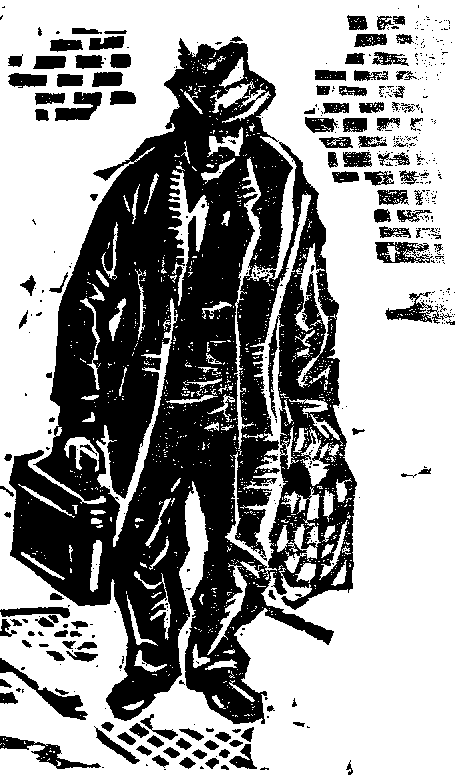 |
||||||||||||
|
November/December 2013
BY PATRICK McCALLISTER
Noel’s voice hasn’t lost its charm, nor her heart its passion. And her heart’s passion today is helping homeless veterans. Thing is, Noel has a way with bureaucrats and corporate types who hand out grants big and small: She irks them. “I’ve done grant requests,” she said. “I’ve done them and done them, and they just throw them aside. The Department of Veterans Affairs has never wanted to help us.” Some of the residents have been around Vetsville for a dozen or more years. Others stay for a few weeks, get on their feet, then head elsewhere. They range from millennials to boomers—more boomers than millennials. What the residents have in common is military service that ended with honorable discharges—and abstinence from drugs. Those are the rules. Honorable discharges and no drugs. Other than that, there aren’t a whole lot of written rules at Vetsville. But there are expectations. Lynne Baldwin is a member of Vetsville’s board of directors. She’s also a lifelong friend of Noel’s. They grew up together in West Palm. In the 1960s Noel followed her heart to New York City to become a model. Then she was off to Hollywood to make movies with Elvis Presley. Baldwin is very much the yin to Noel’s yang. She went to law school and became a prosecutor. She admits that Noel’s largely unstructured and instinctive approach to helping homeless veterans often brings butterflies to her stomach. Baldwin said that the way Noel runs Vetsville is typical of the way she’s done everything—by following intuition, gut feelings, and a strong belief that most people are basically good and want to give and get help. Baldwin said that’s why Noel will never get along with people who wear dress clothes to work every day and hand out grants. “The government gives grants [to help homeless veterans], but it does not give grants to people who don’t fill out tons and tons and tons of paperwork,” Baldwin said. “It’s hurt her.” To understand Vetsville, it’s important to understand its founding. “I was in Washington, D.C., and went to a park across from the White House,” Noel said. “There were homeless people there. Right there, right in front of the White House. I decided to talk to them. I found out most were veterans. I decided I could do something. I could open a shelter. I made lots of phone calls, but no one would help me.” At first, she was dejected. But then: “One day I woke up, and I said, ‘That’s it; I’m going to do this.’ ” The former actress rented a home in Riviera Beach that would become the first Vetsville. “It was in a bad part of town,” Noel said. “A really bad part of town. There was a house burned out across the street. It looked liked a war zone.” But it was close to a VA medical facility, city bus lines, and other infrastructure homeless veterans need. She excitedly showed friends the home, looking to get a few to join her mission. “I showed it to my girlfriend one day,” Noel said. “We were going to lunch. We were in her Jag and we were both in high heels.” The friend’s response was dread of neighborhood criminals, not excitement about helping homeless veterans. “She kept saying, ‘They’re going to kill us,’ ” Noel said. “I said, ‘No, they’re not awake yet.’ ” Noel had few of the resources needed to run a homelessness-prevention program, but she refused to throw up white flags. “I did everything wrong,” she said. “I did it by the seat of my pants and did everything wrong, but we made it.” One thing Noel needed was homeless veterans. She found them the same way she got into homelessness advocacy in the first place—by walking up to homeless people and talking to them. It’s a habit that makes Lynne Baldwin nervous for her friend. “If I took a walk with Chris and saw a guy who was kind of scary, sleeping or something, I’d go across the street,” Baldwin said. “She’d walk up to him and ask, ‘Are you okay? Do you need to eat or something?’ ” It didn’t take Noel long to find homeless veterans wanting help. “I’ve been with her many times when she’s gone up to guys and asked if she could help them,” Baldwin said. “She’s got excellent instincts. She seems to know when she’s safe, and she acts on it.”
“I told him, ‘It’s time to call in all your friends,’” Noel said. “‘You say you have all these friends. Now it’s time for you to find out who your friends are.’ ” Army veteran Donald Marlowe is manager of Vetsville. He started as a resident fifteen years ago. He was living in a rundown home that was demolished to make room for a road. He ended up homeless, living on county-owned land near a solid-waste facility and working temp labor for $42 a day. He was about 60 at the time. When the county moved Marlowe and others from their impromptu camp, Noel got a call. “He was living in the woods,” she said. “I told them to go out to the camp and look for alcohol bottles, cigarette butts, and clear bags—indicators of drug use.” None were found. So Noel went to the camp to tell residents about Vetsville. Marlowe liked what he heard. “Three of us ended up in Vetsville,” he said. “I’m still here.” Marlowe said the rules are fairly simple: Take the chance you’ve been given, get on your feet, and contribute. Marlowe said unemployed veterans must quickly make their way to employment-assistance programs and hit the pavement looking for work. That’s because residents must contribute $100 a week to Vetsville. “If they don’t have employment, we’ll give them a week to stay for free and food’s provided,” he said. “But in that week they need to have something lined up.” Other residents, Marlowe explained, enforce the rule. “They don’t like to pay for someone to be there for free,” he said. “They’ll start to complain about it.” Noel, despite sometimes debilitating fibromyalgia, still taps her fame and makes public appearances to generate funds for Vetsville. It costs about $100,000 a year to run. “We seldom have much money in the bank,” Noel said. “I try to keep at least $5,000 in. You never know when something’s going to happen.” She said fame among Vietnam-era veterans isn’t needed to start and run a homelessness-prevention program. It just takes making an irreversible decision to do it, boldly calling in friends for help, and never giving up. Noel doesn’t hesitate to remind people why they should help Vetsville. “These are human beings who were willing to fight a war for us, even if you don’t agree with the war,” she said. For more information, call 561-714-0025 or email vetsville@aol.com The website is www.vetsville.org
|
||||||||||||
|
|
||||||||||||
|
||||||||||||
8719 Colesville Road, Suite 100, Silver Spring. MD 20910 | www.vva.org | contact us |
||||||||||||










 “Hi, love,” Chris Noel greeted. Her signature words are familiar to many Vietnam veterans who listened to A Date with Chris on Armed Forces Radio. Now in her 70s,
“Hi, love,” Chris Noel greeted. Her signature words are familiar to many Vietnam veterans who listened to A Date with Chris on Armed Forces Radio. Now in her 70s, The other thing Noel needed was resources. She acquired them two ways: by brazenly asking friends and contacts to help with individual needs, and by getting homeless veterans to do the same. Vetsville recently had a new resident, a recent veteran, whose life spiraled downward after he lost his car in an accident.
The other thing Noel needed was resources. She acquired them two ways: by brazenly asking friends and contacts to help with individual needs, and by getting homeless veterans to do the same. Vetsville recently had a new resident, a recent veteran, whose life spiraled downward after he lost his car in an accident.